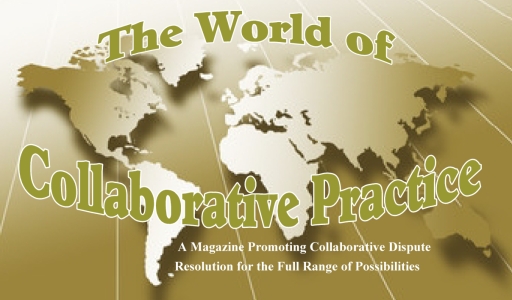A Question and Answer session with Florence Gladel, the European pioneer on the subject of “The Harvard Principled Negotiation”. Avocat Gladel will be presenting on this topic at the Ordre Des Avocats Du Barreau De Paris (Paris Bar Association) on July 6, 2012 in Paris. The workshop is titled “The Harvard Principled Negotiation” She would be delighted to have you attend and discuss collaborative practice in France. What is the Harvard Principle Negotiation? Florence GLADEL: Roger Fischer and William Ury, two US lawyers and professors at Harvard, are the authors of the seminal book Getting to Yes: Negotiating Agreement Without Giving...
Talking With….Woody Mosten, 7
posted by admin
What skills and attitudes are involved in being a Collaborative Practice professional? In being a ‘peacemaker’? How do we work with others who might have ‘slipped’ from their best attitudes and skills? Don’t forget to share your thoughts in the comment section below. Today’s Guest: Mark B. Baer, JD Pasadena, CA www.markbaeresq.com Here’s a piece by Mark that we’ve published. (Would you like to join us for a future conversation? We’ll have room for up to four people. Sign up here for our email list. We send out notices and details of when and how you can join in the discussion.)...
“Talking With….” Linda Solomon
posted by admin
Using the Collaborative Process gives a divorcing couple access to ‘coaches’, licensed mental health professionals who will support them in many ways through the process. Linda Solomon, LPC, LMFT shares with us why having such a person involved in the process is of benefit. She answers questions that many people have about how that works, how it can save money, and how working with such a person can actually help to begin the healing process and form the beginnings of the way their new relationship will look and work. Here’s our conversation: Click below to hear this interview that Linda did with Public Media...
Talking With…. Woody Mosten, 6
posted by admin
“I’m ‘collaborative’ and you’re not.” How do we work then that comes up? What does it mean? These questions are at the center of our discussion today. We first cover the situation of one professional not having received even Basic Collaborative Practice training. We talk as well about the role Practice Groups can play here. And we found that this is a topic that will likely carry us through several sessions. Later in the conversation we also talked about how that interplays with the differing challenges facing the members of each profession approaching Collaborative Practice. Don’t forget to...
Divorce – Easing the Children’s Transition from Li...
posted by admin
by Lee Chabin, Esq. Divorce is hard on adults and children alike. But, unlike adults, children have little or no say in what happens. Even if you were not the one to initiate the divorce, no doubt there are many decisions you will get to (have to?) make, perhaps including whether to remain at your current job, and which neighborhood to live in. Our kids, on the other hand, will live and attend school where we (or a judge) decide. None of us like to feel out of control, and where we can, it is wise to grant our children the power to make their own decisions – up to a point. Let’s take the example of a new home. Pretend that you have...
Talking With…. Woody Mosten, 5
posted by admin
How does a new trainee break into Collaborative Practice? How do Collaborative Practice and Mediation ‘relate’? Is one necessary or sufficient for the other? These questions are at the center of our discussion today. Don’t forget to share your thoughts in the comment section below. Today’s Guests: Carol Miller, LCPC Downers Grove, IL Profile Kevin Scudder, JD Seattle, WA www.scudderlaw.net (Would you like to join us for our next conversation? We’ll have room for up to four people. Sign up here for our email list. We send out notices and details of when and how you can join in the discussion.)...








Connect With Us!